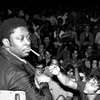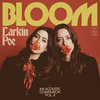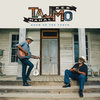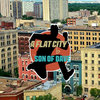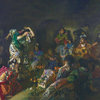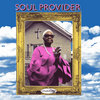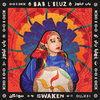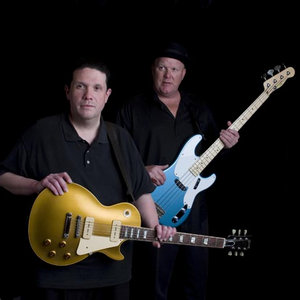Barrelhouse Stomp by Chris James and Patrick Rynn
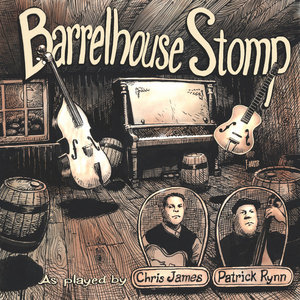
You’ll never find a blues guitarist who appreciates the integral role of piano in his chosen idiom more than Chris James. That’s why Chris and his musical partner of two decades, bassist Patrick Rynn, named this set Barrelhouse Stomp. Every hard-hitting selection boasts rock-solid piano accompaniment. Chris and Patrick recruited three of the finest blues pianists on the planet—Henry Gray, Aaron Moore, and David Maxwell—to take part in this project.
Much like its predecessors, the duo’s third album for Michael Frank’s Earwig label is firmly rooted in traditional Chicago blues. Yet they continue to evolve and take chances in the studio. “I don’t want to keep putting out the same CD,” says Chris. Ensemble playing has always been the cornerstone of the San Diego-based pair’s approach, but there’s an increased emphasis on sizzling solos here. After all, with this all-star lineup of guests, they need space to strut their stuff. In addition to the 88s aces, a pair of Chicago legends, guitarist Jody Williams and saxist Eddie Shaw, are on board.
Chris, Patrick, and their longtime collaborator, harpist Rob Stone, have crafted another batch of splendid originals, kicking off with the storming shuffle “Goodbye, Later For You.” Stone conjures up a full-bodied solo, as does Chris, whose vocals ring with authority. “We try to write stuff that’s not really one-dimensional. We want it to have some depth and some staying power,” says Patrick. “We like to write our songs, for the most part, from personal experience.”
Jody and Eddie wail on “Just Another Kick In The Teeth,” reminding us why they’re so crucial to the Windy City scene. This song’s sinuous groove is a bit more modern than usual for the duo, stemming from Lowell Fulson’s ‘67 hit “Tramp.” For the first time on record, four time-BMA-nominated bassist Patrick steps out for a solo. “It’s not really the job of a bass player to be taking bass solos. The job of the bass player is to drive the band and make the guy out in front look good,” says Rynn. “But on that one, it was a little bit different.” The uncompromising lyrics are grounded in personal experience. “It’s about the trials and tribulations of running a band,” says Chris.
Jody’s front and center on the slashing Bo Diddley-beat instrumental “Messin’ With White Lightnin’,” its title having nothing to do with moonshine (White Lightnin’ is the name of Jody’s axe). “That was the first thing on the docket when we recorded: let’s do this instrumental based on a ‘Who Do You Love’ theme,” says James, recalling Williams’ killer solo on Bo’s original.
Chris lays down some homespun wisdom on “A Fact Is A Fact,” breaking out his slide while two saxes push his crashing riffs. “I like playing slide, and Elmore James is one of my big guys,” he says. “He just had a real profound influence on me, so I always want to include at least one slide song.” The insightful lyrics of “It Always Could Be Worse” come poured over a surging mid-tempo thrust. “It may be bad, but it can be worse,” reasons Chris. “I’ve always said that.” This track marks another first: James plays harp, which he tackled before he picked up a guitar. “Michael Frank has seen me play harmonica, so he’s been bugging me for the last few years to play harmonica on this CD,” says Chris, who also plays his ‘56 Les Paul Goldtop on the number.
The sax-cushioned rocker “Last Call Woogie” spotlights the ageless Gray, a Baton Rouge fixture for decades after spending much of the ‘50s and ‘60s with Howlin’ Wolf. “I always say, ‘When I grow up, I want to be just like Henry Gray!’” says Chris. “He still plays his butt off. He has a left hand that drives the entire band.”
This set finds Chris and Patrick updating three pre-war classics, two featuring Chicagoan Aaron Moore’s rolling ivories. “He’s the last of those guys that play that barrelhouse style,” says Chris. “The very first time I heard Aaron, the hair on the back of my neck stood up.” “I Feel So Good” hails from Big Bill Broonzy’s 1941 repertoire; “Before It’s Too Late” harks back another decade-plus. “That song is based on Charlie Spand’s ‘Good Gal,’” explains James. “Later I heard a version by Pinewood Tom, who was Josh White, so I kind of melded the two songs together.” Both performances feature the late Willie “Big Eyes” Smith on typically flawless drums.
“It was really important that we put those two tracks on the CD,” says Chris, “as a tribute to Willie.” Adds Patrick, “To actually get to play with him, that’s just priceless.”
Little Brother Montgomery introduced his piano anthem “Vicksburg Blues” in 1930. It’s been a favorite of Chris’ since he first heard it on the radio when he was 12 years old. “It hit me like a ton of bricks,” he says. Ironically, this started out to be an instrumental, only to change direction in the studio. “The scratch vocal was amazing,” says Patrick. “Everybody’s mouths were hanging open. It was like, ‘Man, you need to sing this song!’ So he did, and it gives you goosebumps.” Maxwell does Little Brother’s signature theme full justice on the keys, while Jody plays the low-end guitar part that he originated on Howlin’ Wolf’s “Forty Four” and Chris adapts some pre-war Charley Patton and Tommy Johnson-style guitar patterns to the tune.
Junior Parker’s ‘63 vintage “I’m Gonna Stop” displays James’ vocal versatility, as he leaves guitar duties here to Jody. “That was the very first song that Chris and I recorded together on our very first demo tape,” notes Rynn. In all, this is the fourth time they’ve cut the song (the rest were shelved). “After 20 years, I finally got that one down where I’m satisfied,” says James.
Not long before Smith’s passing, piano great Pinetop Perkins left us as well, inspiring a blistering tribute here. The Boston-based Maxwell, a frequent and very sympathetic musical cohort of Chris and Patrick’s, lets rip with several choruses of thundering boogie on “Take It Easy Baby” that Pinetop would no doubt have adored (dig the sly ending, a Pinetop trademark). “Ever since the first time we got to play with him, it was like we’d been playing with him for 50 years,” says Patrick. Stoking the beat is Willie Hayes, another primary Chicago associate of the duo and as musical a drummer as you’ll ever encounter.
“He’s not just up there doing a beat,” marvels Rynn. “He’s weaving in and out, he’s playing and answering and doing call-and-response with the sticks and the fills and the builds.”
This set’s Elmore cover revisits his swaggering instrumental “Bobby’s Rock,” sporting Chris’ slashing slide work. The original blueprint for this set didn’t include the number, done at the tail end of an uncommonly efficient five-song session in Tempe, Arizona with Gray.
“Henry said, ‘That was quick!’” says Chris. “I looked at the clock, and it was an hour-and-15 minutes. He goes, ‘Well, let’s not end on a slow song!’” Just for kicks, Chris counted off “Bobby’s Rock.” “Thankfully, Clarke Rigsby kept the tape rolling,” he says. “Everybody that heard that song said, ‘There’s absolutely no way that this song is not going to be on this CD!’”
Even though their high-energy attack is grounded in postwar Chicago blues, Chris James and Patrick Rynn are decidedly of this moment. “I didn’t live in the ‘50s. I live right now, and all the songs that we write are about people and situations and things that happen to us. Our own experiences,” says James. “The idea is that you create your own sound. We’re playing blues, and it’s a language. And you try to find your little niche and your style in that.”
--Bill Dahl
Tracklist
| 1. | Goodbye, Later For You | 4:30 |
| 2. | Just Another Kick In The Teeth | 3:51 |
| 3. | I Feel So Good | 3:48 |
| 4. | Messin' With White Lightnin' | 5:11 |
| 5. | Before It's Too Late | 4:24 |
| 6. | A Fact Is A Fact | 4:12 |
| 7. | It Always Can Be Worse | 3:19 |
| 8. | I'm Gonna Stop Foolin' Myself | 5:14 |
| 9. | Vicksburg Blues | 5:34 |
| 10. | Bobby's Rock | 4:45 |
| 11. | Take It Easy (A Tribute To Pinetop Perkins) | 3:48 |
| 12. | Last Call Woogie | 4:50 |
Credits
Special Guests: Blues Legends Henry Gray, Jody Williams, Eddie Shaw, Willie "Big Eyes" Smith and Aaron Moore
